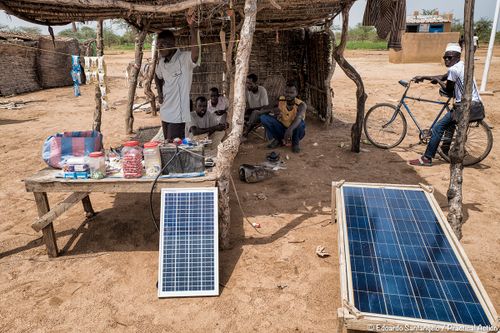Webinar Series: Sustainable Energy in Humanitarian Settings
Webinar Series Sustainable Energy in Humanitarian Settings

Today, over 130 million people are in need of humanitarian assistance due to conflict, natural disasters, and other complex global challenges. For many of these people, access to energy sources is critical for survival, and how they access it impacts their health, livelihoods, safety, and well-being.
Energy access for displaced people is not prioritized in the global humanitarian system. Current energy practices in situations of displacement are often inefficient, polluting, unsafe for users, and harmful to the surrounding environment. Moreover, institutional humanitarian operations such as water pumping, community lighting, and health clinics rely heavily on unsustainable fossil fuels, costing hundreds of millions of dollars annually.
Given the complex nature of humanitarian response and the challenges of integrating sustainable energy solutions into the humanitarian program cycle, there is not just one solution but a need for systemic actions to mobilise resources, build capacity and use the opportunity for sustainable energy solutions to enhance impact in sectors such as health, protection, food security, and WASH. read more
Against this background, key actors involved in displacement settings developed in 2018 the Global Plan of Action for Sustainable Energy Solutions in Situations of Displacement (GPA). It’s mission is to equip stakeholders with the capacity to mainstream sustainable energy solutions into programming, with the goal of delivering improved protection, dignity, and energy-related social, environmental, and economic benefits to displaced people.
As part of the outreach and capacity building activities of this movement, the International Committee of the Red Cross (ICRC) together with the Steering Group of the GPA and other partners are conducting a series of webinars on humanitarian energy issues to raise awareness and spread knowledge about different technologies, best practices and impacts.
- Webinar 1: Energy-Livelihoods Nexus
- Webinar 2: Tools and Delivery Models
- Webinar 3: Finance, Technology Supply Chains, Market Linkages and Stakeholder Roles
Understanding the Energy-Livelihoods Nexus: Challenges and Opportunities in Humanitarian settings
Tuesday, 1 March, 2pm - 3:30pm CET
Register here: https://register.gotowebinar.com/register/4383793962666664205
This webinar focuses on the energy-livelihoods nexus in humanitarian contexts. It will present options for energizing different value chains as well as discussing common challenges in meeting needs not only with regard to end-users but also from development and private sector partners. A following panel discussion with practitioners and entrepreneurs from i.e. Kenya and Tanzania will highlight different examples of how renewable energy has benefitted livelihoods.
Speakers
Surabhi Rajagopal, Senior Program Manager, SELCO foundation. Surabhi has been working with SELCO Foundation since 2011, on aspects of ecosystem building for energy access including financing, skill development and policy, from a Practitioner perspective. Her work includes bottom-up planning, programme design and policy engagement to integrate sustainable energy solutions for livelihood improvements and healthcare delivery, including in humanitarian settings. She has a Masters in Environmental Policy and Regulation from the London School of Economics, UK.
Alexandre Gachoud, International Committee of the Red Cross (ICRC)
Vasco Amisi (Resilience Action, Okapi Green), Vasco, a Congolese refugee, spent the most part of life in internal displacement, as well as in refugee camps outside the country, living in Kakuma Refugee Camp, Kenya since 2010. Vasco is co-founder of Resilience Action formerly SAVIC which was founded in 2010 as a self-help group and later became a CBO and is now an NGO that is benefiting thousands of people in Kakuma. Having contributed to the starting of this rapidly growing community-based organization Solidarity & Advocacy in Crisis (SAVIC) has given a great chance to make change happen in the refugee communities in Kakuma. Under Vasco's leadership, cases of adolescent pregnancies have considerably reduced in Kakuma, through various programs initiated at SAVIC, which include the Nuru Vocational Training Center, the Ubuntu Savings & Loans Associations, and Peer Educator's Mentoring initiatives.
Turned entrepreneur, he is currently CEO of Okapi Green, a refugee-owned for-profit enterprise operating in Kakuma Refugee Camp in northern Kenya. Formalized in 2018, Okapi Green works to increase access to quality, affordable, and reliable electricity for the community of Kakuma. They installed a 20 kwp solar mini-grid to supply electricity to 200 small businesses, community centers, and individual households within the camp, supplying electricity to the end users via smart meters. In addition, the project also offer a Wi-Fi mesh network, to help boost productivity of the business being reached.
Planning Energy-Livelihoods Interventions in Humanitarian Settings - Tools and Delivery Models
Tuesday, 15 March, 2pm - 3:30pm CET
Register here: https://register.gotowebinar.com/register/6875199350291348749
In session 2, we will hear from organizations with expertise on planning and implementing energy access for livelihoods purposes, with a focus on inspiring and innovative delivery models emerging in conflict and crisis affected areas.
The Energy-Livelihoods Ecosystem in Humanitarian Settings - Finance, Technology Supply Chains, Market Linkages and Stakeholder Roles
Tuesday, 29 March, 2pm - 3:30pm CET
Register here: https://register.gotowebinar.com/register/2482543744698361871
In session 3, we will explore the ecosystem aspects of delivering energy for improved livelihoods purposes such as access to finance, market linkages, and technology supply chains, followed by a multi-stakeholder panel discussion on the roles of different partners in bringing energy-livelihoods projects to life.
Past Webinars
- Webinar Series on Decarbonisation of Energy Infrastructure in Displacement Situations
- How to Integrate Renewable Energy Solutions into Humanitarian Response Planning? (Sept 2021)
- Landscaping : Capacity Building and Knowledge Sharing Opportunities (Feb 2021)
- Productive Uses of Energy in Humanitarian Contexts (Oct 2020)
- Powering Possibilities : Lessons Learned from Mini-grid Application in Conflict and Fragile Contexts (Sep 2020)
- Powering WASH : Renewable Energy for Water Supply in Humanitarian Settings (June 2020)
- Powering Humanitarian Health Operations : Sustainable Energy Solutions (May 2020)
- Energy Efficiency and Designing for Sustainability in Humanitarian Response (Feb 2020)
- Powering Humanitarian Facilities : Dialogue on Implementation Models (Jan 2020)
- Sustainable Energy for Household Cooking Needs in Humanitarian Settings (Dec 2019)
- Sustainable Energy for Powering Household and Community Lighting Needs in Humanitarian Settings (Nov 2019)
- Sustainable Energy for Essential Humanitarian Services : Outline of Energy Solutions and a Case Study on Solar Pumping (Sep 2019)
- State of Play : Sustainable Energy in Humanitarian Settings (June 2019)
Further Resources on Humanitarian Energy
Find here some useful resources for further information:
Available resources on energypedia
Global Plan of Action
- Global Plan of Action - Framework for Action
- Global Plan of Action - Unitar website
- Identification And Analysis Of Standard Clauses Of PPA And Leasing Agreements For Energy Provision In The Humanitarian Sector
- Feasibility and Applicability of a Global Guarantee Mechanism in Humanitarian Energy Contracts
- SAFE Workshop 2019 - Final Report
- Humanitarian Energy Conference 2019 - Final Report
- Renewable Electrification of Refugee Camps – Phase 1
Mercy Corps
Moving Energy Initiative
- The Costs of Fuelling Humanitarian Aid (2018)
- The Solar Energy Handbook - A guide to institutional solar for organizations working in humanitarian settings
- Private-Sector Engagement - The Key to Efficient, Effective Energy Access for Refugees. Toolkit (2016)
- Heat, Light and Power for Refugees Saving Lives, Reducing Costs (2015)
- Prices, Products and Priorities - Meeting Refugees’ Energy Needs in Burkina Faso and Kenya (2018)
Renewable Energy Transition
- McKinsey (2019): Energy Perspective 2019: Reference Case
- World Economic Forum (2019): Fostering Effective Energy Transition 2019
- World Economic Forum Website: Shaping the Future of Energy
Grantham Instittute
Blog Articles
- Rachel Kyte: https://www.seforall.org/news/on-world-humanitarian-day-its-time-we-finally-talk-about-energy-access
- Vijay Bhopal and Sandy Robinson: Is Sustainable Attainable?





















